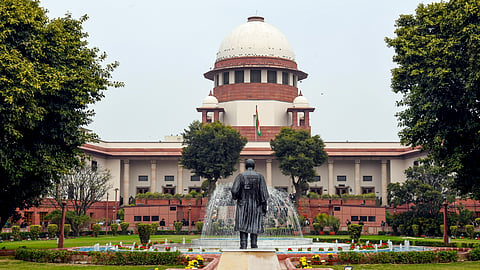

NEW DELHI: In a landmark verdict, the Supreme Court on Monday held that no person can be denied recruitment in the judicial service solely on account of their physical disabilities.
The apex court's two-judge bench, headed by Justice J B Pardiwala and Justice R Mahadevan pronounced the judgment after hearing a batch of petitions, including a suo motu one of a visually-impaired candidate's mother from Madhya Pradesh, for denying reservations to such candidates in judicial services of certain states.
The visually-impaired candidate's mother from MP had written a letter to the Chief Justice last year, challenging a provision in the Madhya Pradesh Judicial Services (Recruitment and Service Conditions) Rules that prevented visually impaired candidates from being appointed in the state judicial services. After receiving the letter, the top court converted this letter petition into a suo motu plea and decided to hear it on its own.
The Supreme Court bench, while quashing the MP rule barring blind candidates from getting jobs in the district judiciary, said, "We have touched upon constitutional framework also and institutional disability jurisprudence."
While pronouncing the important Verdict, Justice Mahadevan said, "No person can be denied consideration for recruitment in the judicial service solely on account of their disabilities."
The top court stressed in its verdict that persons with disabilities must not face any discrimination in their pursuit of judicial service recruitments and that the State must provide them affirmative action to provide an inclusive framework.
"Any indirect discrimination that results in the exclusion of persons with disabilities, whether through cutoff or procedural barriers must be interfered with to uphold substantive equality," the Court said.
Delivering the judgment in favour of the visually impaired candidates across India, the apex court said that right-based approaches necessitate that persons with disabilities must not face any discrimination in the pursuit of judicial service opportunities.
The court held this issue as "most important" and said it has come to the conclusion after discussing many judgments, including Sunanda Bhandari's case, Indra Sawhney constitutional framework and many others.
Justice Mahadevan, who was the author of the judgment, said that Rule 6A of the MP Judicial Services Rules 1994 was struck down insofar as it excludes visually impaired and no-vision candidates from appointment in judicial services.
The court highlighted that affirmative action must be taken on behalf of the state to provide an inclusive framework.
"Any indirect discrimination that results in the exclusion of PWDs, whether through cutoff or procedural barriers must be interfered with in order to uphold substantive equality," it said.
The court set aside the order of the HC and the February 18, 2023, notification issued by the State of Madhya Pradesh.
"The appellants and similarly placed persons who had participated in selection process are entitled to be considered in the light of this decision and they may be appointed if they are otherwise eligible," the top court said.